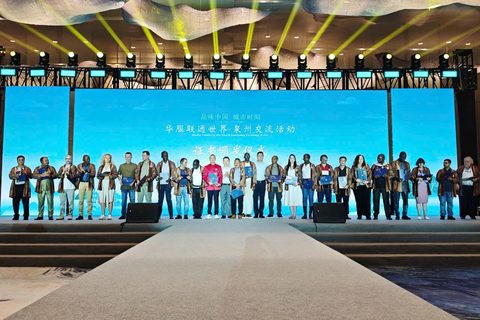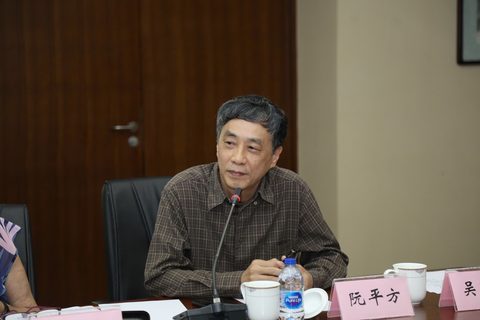Writer Nguyễn Bình Phương, Vice President of the Vietnam Writers’ Association, emphasized that “Culture is a catalyst for peace and development” during his participation at the Global Civilization Dialogue Conference held in Beijing from July 5 to 12, 2025, as a representative of the Vietnam Writers’ Association.
As part of the event, several cultural and literary activities were held in Fujian Province, China. A notable highlight was the program “Flavors of China, Local melodies” in Quanzhou. This event aimed to promote cultural exchange, showcase local specialties, and present creative designs with strong regional Chinese identity to international audiences. It featured vibrant activities such as modern ethnic fashion shows, exhibitions of traditional handicrafts, and spaces for business and trade interaction.
Particularly, 26 delegates from 22 countries including Vietnam joined the fashion show and an award ceremony that recognized influential international cultural service products.
Speaking on the sidelines of the event, writer Nguyễn Bình Phương remarked that activities like “Flavors of China, Local melodies” demonstrate the spirit of dialogue and mutual understanding among cultures. He noted:
"By introducing local values, the Chinese people have shown their desire for cultural exchange and broader connections with the world. This is a crucial factor in enabling culture to become a true catalyst for peace, development, and deeper mutual understanding between nations.”

The Global Civilization Dialogue Conference attracted participation from over 600 delegates representing 22 countries. Photo: NVH
During his time in Fujian, writer Nguyễn Bình Phương visited several cultural and historical landmarks such as the Quanzhou Maritime Museum, Tầm Phố Village, Gulangyu Island (Xiamen), and the Sanfang Qixiang historical district in Fuzhou. He also attended meetings with Fujian provincial leaders and took part in forums on the “Maritime Silk Road.”
After the program in Fujian, Nguyễn Bình Phương and other international delegates traveled to Beijing for the main activities of the Global Civilization Dialogue Conference, held on July 10–11.
Following the opening session with over 600 delegates from China and around the world, Nguyễn Bình Phương engaged in a dialogue with Zhang Hongshen, President of the Chinese Writers’ Association, and representatives from writers' associations of Nepal, Argentina, Cambodia, Myanmar, as well as sinologists from Hungary, Bulgaria, and Vietnam.
At the dialogue, he delivered a heartfelt speech titled “The house without the shadow of the three Banh spirits,” which left a deep impression on attendees. He began with a simple yet profound thought: “I believe the formation of the family was the first step in human civilization. So perhaps every story should start with the family.”

Writer Nguyễn Bình Phương
Drawing from personal experiences growing up with six siblings during times of war and hardship, he offered a universal lesson about overcoming conflict and difference. He recalled his mother’s words when they worried about dividing their small home: “As long as you stay united, there will be room for everyone... If you truly listen to and understand one another, unity will come naturally.”
Nguyễn Bình Phương used his personal story to highlight larger global issues. He noted that the world is built on differences not just between East and West, but even among Eastern nations like Vietnam and China.
“From my family’s story, I realized that if we listen and empathize with one another, we can avoid unnecessary conflict and misunderstanding. Lack of understanding often leads to miscommunication and dead ends.”
He introduced a powerful metaphor - the “Three Banh spirits” from Chinese folklore: Banh Kieu, Banh Cu, and Banh Chat - figures symbolizing anger, blindness, and rash actions. He warned that when nations fail to understand one another, these “spirits” can take control.
"Every nation has these spirits within. What matters is how well each nation can restrain them. Peace and cooperation depend greatly on that ability."

Writer Nguyễn Bình Phương with delegates from other countries - Photo: NVH
His reflections also touched on the personal level, especially the power of literature. He shared that literature offers a unique path for people to truly listen to and understand one another. "In Vietnam, contemporary Chinese literature is widely translated and read. This shows the Vietnamese-especially our writers have a sincere and open-hearted desire to understand modern China through its literature. Literature best expresses a nation's soul and character."
He closed his speech with a clear and moving message of peace: "To me, peace is a house built on understanding and tolerance among brothers. And of course, that house must have no place for the three Banh spirits."
Writer Nguyễn Bình Phương’s journey not only represented Vietnam in a global dialogue on civilization but also helped deepen people-to-people exchanges and lay a foundation for cultural, artistic, and economic cooperation between Vietnam and China. His sincere and thoughtful speech sent a powerful message: only through understanding and tolerance can we build a peaceful world.
Translate by MINH KIÊN
VNQD